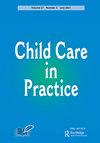A Comparison of Playworkers and Non-playworkers Who Use a Playwork Approach
IF 1.4
Q3 FAMILY STUDIES
引用次数: 0
Abstract
The International Playwork Census (IPC) was undertaken to compare demographic data from both playworkers and non-playworkers who use a playwork approach in their work. Data were collected from 273 responses in nineteen di ff erent countries re fl ecting the growth of playwork from its United Kingdom beginnings. Results showed the combined playwork (102 responses) and non-playwork (171 responses) workforce is female, white with no registered disability with an average age of 44.8 years. There were also signi fi cant di ff erences between job roles in relation to sector employed, playwork training and play quali fi cations undertaken. There were di ff erences between playworkers and non-playworkers. Playworkers were signi fi cantly found to work in management or practice within the Third (Voluntary) sector and have playwork quali fi cations. Non-playworkers were signi fi cantly employed in the statutory sector, work at the board level and have no playwork quali fi cation. Up-to-date demographic data are important to develop the professionalisation of playwork. This study provides a current pro fi le of professionals working with children in a play context who see themselves as belonging to the playwork fi eld. It provides a unique insight into two di ff erent sectors within the playwork fi eld: adults who describe themselves as “ playworkers ” and adults who describe their practice as “ a playwork approach ” .使用游戏方法的游戏工作者和非游戏工作者的比较
国际游戏普查(IPC)是为了比较在工作中使用游戏方法的游戏工作者和非游戏工作者的人口统计数据。数据收集自19个不同国家的273份反馈,反映了游戏从英国开始的发展情况。结果显示,参与游戏工作(102份回应)和非游戏工作(171份回应)的员工均为女性,白人,无残疾登记,平均年龄为44.8岁。工作角色之间在与所雇用的部门、游戏训练和所从事的游戏资格有关的方面也存在显著差异。游戏工作者和非游戏工作者之间存在差异。游戏工作者被发现在第三(自愿)部门的管理或实践中工作,并具有游戏资格。非游戏工人大量受雇于法定机构,在董事会层面工作,并没有游戏工作资格。最新的人口统计数据对于发展游戏的专业化非常重要。本研究提供了目前在游戏环境中与儿童一起工作的专业人员的情况,他们认为自己属于游戏领域。它提供了对游戏领域中两个不同部门的独特见解:将自己描述为“游戏工作者”的成年人和将自己的实践描述为“游戏方法”的成年人。
本文章由计算机程序翻译,如有差异,请以英文原文为准。
求助全文
约1分钟内获得全文
求助全文
来源期刊

Child Care in Practice
Nursing-Community and Home Care
CiteScore
3.30
自引率
5.30%
发文量
32
期刊介绍:
Child Care in Practice is a quarterly, peer-reviewed journal that provides an international forum for professionals working in all disciplines in the provision of children’s services, including social work, social care, health care, medicine, psychology, education, the police and probationary services, and solicitors and barristers working in the family law and youth justice sectors. The strategic aims and objectives of the journal are: • To develop the knowledge base of practitioners, managers and other professionals responsible for the delivery of professional child care services. The journal seeks to contribute to the achievement of quality services and the promotion of the highest standards. • To achieve an equity of input from all disciplines working with children. The multi-disciplinary nature of the journal reflects that the key to many successful outcomes in the child care field lies in the close co-operation between different disciplines. • To raise awareness of often-neglected issues such as marginalization of ethnic minorities and problems consequent upon poverty and disability. • To keep abreast of and continue to influence local and international child care practice in response to emerging policy. • To include the views of those who are in receipt of multi-disciplinary child care services. • To welcome submissions on promising practice developments and the findings from new research to highlight the breadth of the work of the journal’s work.
 求助内容:
求助内容: 应助结果提醒方式:
应助结果提醒方式:


